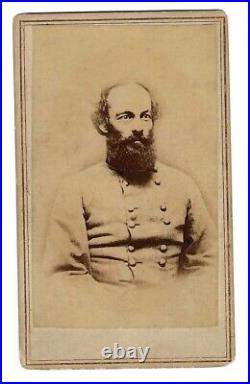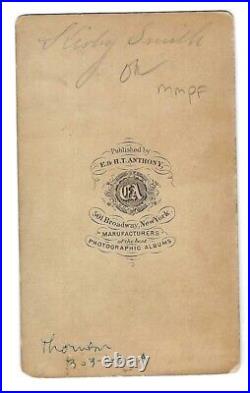Civil War CDV Confederate General Edmund Kirby Smith



General Edmund Kirby Smith (May 16, 1824 - March 28, 1893) was a senior officer of the Confederate States Army who commanded the Trans-Mississippi Department (comprising Arkansas, Missouri, Texas, western Louisiana, Arizona Territory and the Indian Territory) from 1863 to 1865. Before the American Civil War, Smith served as an officer of the United States Army.
Smith was wounded at the First Battle of Bull Run and distinguished himself during the Heartland Offensive, the Confederacy's unsuccessful attempt to capture Kentucky in 1862. He was appointed as commander of the Trans-Mississippi Department in January 1863. The area included most actions east of the Rocky Mountains and west of the Mississippi River.
In 1863, Smith dispatched troops in an unsuccessful attempt to relieve the Siege of Vicksburg. After the United States retook control of Vicksburg in July, the Trans-Mississippi Department was cut off from the rest of the Confederacy and became virtually an independent nation, nicknamed "Kirby Smithdom". In the Red River Campaign of Spring 1864, he commanded victorious Confederate troops under Major-General Dick Taylor, who defeated a combined U. Army & Navy assault under U. On June 2, 1865, Smith surrendered his army at Galveston, Texas, the last general with a major field force. He quickly fled to Mexico and then to Cuba to avoid arrest for treason.His wife negotiated his return during the period when the U. Government offered amnesty to those who would take an oath of loyalty to the United States.
After the war, Smith worked in the telegraph and railway industries. He also served as a professor of mathematics at the University of the South in Tennessee. He botanized plant specimens and bequeathed his collection to the University of Florida.
